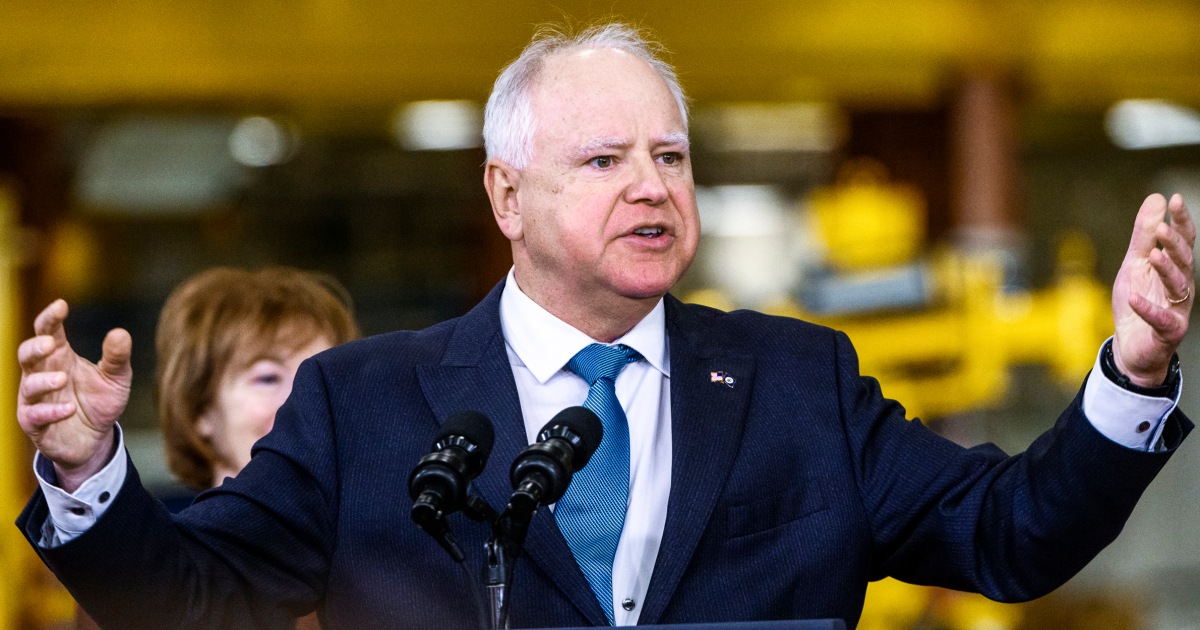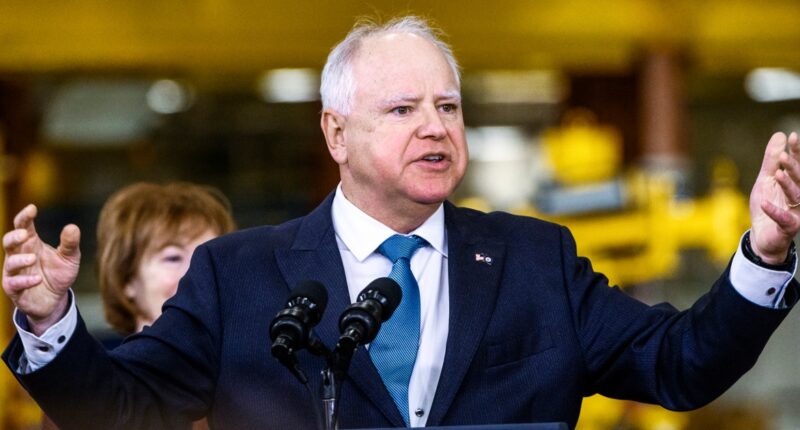
When Minnesota Democrats won back the majority in the state Senate last fall, they achieved the dream: a trifecta of control across the Legislature and the governor’s office.
They weren’t the only ones. Democrats did the same in Maryland, Massachusetts and Michigan, whereas Republicans failed to nab any new trifecta in the 2022 elections.
But it’s Minnesota that’s attracting attention as a laboratory for how to effectively use that power to achieve progressive policy priorities.
Nearly four months into the legislative session, Democrats in the state have already tackled protecting abortion rights, legalizing recreational marijuana and restricting gun access — and they have signaled their plans to take on issues like expanding paid family leave and providing legal refuge to trans youths whose access to gender-affirming and other medical care has been restricted elsewhere.
“These [policies] are things that have a direct and clear impact on improving people’s lives,” U.S. Sen. Tina Smith, D-Minn, said. “And that’s what Minnesotans are looking for. They’re looking for evidence — just as voters are nationally — that the government that they elect can deliver results for them.”
Interviews with a dozen federal and state lawmakers in Minnesota, as well as progressive activists in the state and across the country, paint a picture of a state fully controlled by Democrats that has offered protections on key Democratic social issues like abortion and LGBTQ rights while maintaining a robust economy and low crime — two subjects allies say simultaneously help curtail conservative narratives about Democratic-run cities.
And unlike in Michigan — another swing state where Democrats, also fresh off winning a trifecta, have leveraged that power to advance party priorities like abortion rights and gun safety — the sheer breadth and quantity of policies already, or soon to be, enacted in the Minnesota Legislature present a much more complete sample of Democratic ideals in the current moment, those officials and advocates said.
“When you’re looking at what’s possible with a trifecta, look at Minnesota,” said Daniel Squadron, the executive director of The States Project, a left-leaning group that works to build Democratic majorities in state legislatures.
“Fewer than 90 days into the new year they’ve done more things than a just a quote allows me to list to improve people’s lives,” he said.
Supporters also say Democrats’ accomplishments in Minnesota could offer clues about how the party could effectively send messages about crucial issues heading into the 2024 cycle.
“This isn’t about jamming down Democratic priorities. These are proven things that improve people’s lives,” Democratic Gov. Tim Walz said in an interview, adding that his party’s policy goals so far “are about not allowing our people to be demonized” because of “Republicans wanting to go to war on social issues.”
Squadron said, “Not only are Minnesotans are going to benefit from it, but the rest of the country could, as well.”
‘Minnesota is the model’
Just over halfway through their legislative session, Minnesota legislators have already enacted or advanced measures that touch nearly every area of the Democratic Party platform, including policies about reproductive rights, democracy, voting, green energy and LGBTQ protections.
Weeks after their sessions kicked off, Democrats in the Legislature moved to enshrine abortion rights into law, making Minnesota the first state to do so this year. The state still restricts the procedure after a fetus is determined to be viable — usually around 24 weeks — but the restrictions remain enjoined.
Abortion-rights advocates have touted the new law as especially crucial for pregnant women in states bordering Minnesota — like Wisconsin, South Dakota and North Dakota — where abortion remains illegal after the Supreme Court struck down Roe v. Wade.
In addition, state Democrats approved what advocates have called the largest expansion of voting rights in the state in decades. The bill, which Walz signed last month, restored voting rights to people who were incarcerated as soon as they completed their sentences — a measure that was expected to affect almost 60,000 people. Previously, people who had once been incarcerated had those rights restored only after they completed a yearslong probation process.
And this month, the state House passed what Democrats have called another “pro-voter” bill that would institute automatic voter registration and pre-registration for 16- and 17-year-olds. It would also curtail the spending of so-called dark money in state and local races. The Senate is expected to pass the corresponding bill, and Walz has vowed to sign it.
In addition, Democrats in the Legislature are on the verge of passing laws that would expand background checks for gun purchases, along with a “red flag” measure that would make it easier for officials to take guns away from people deemed to be threats to themselves or others.
Legislators are also poised to pass a bill that would legalize the recreational use of marijuana.
Meanwhile, legislators increased school funding, including enacting a program that provides universal breakfast and lunch for every student in the state regardless of income; established a program that set new green energy goals, most notably requiring utility companies to offer customers carbon-free electricity by 2040; and expanded public child care support programs.
In the coming weeks, they are expected to advance legislation that would expand paid family and sick leave to 12 weeks.
“States really are these places where policy can happen, can be copied by other states and then ultimately go national,” said Jeff Blodgett, a Democratic strategist based in St. Paul.
“And right now, Minnesota is the model for that,” he said.
The state House has also passed a first-of-its-kind interstate transgender refuge bill that in effect would establish programs to help welcome transgender people seeking gender-affirming health care who have been ostracized or prevented from getting such care in conservative states. Senate leaders have signaled that they, too, will advance it, and Walz has said he would sign it.
“There’s policy areas that are coming up on the horizon — ones where we’re going to have to be champions for people,” Walz said. “I say that not just to Minnesotans. We’re gonna have to be champions for the nation.”
Progressive activists have celebrated not just the quality and breadth of policies passed by the Minnesota Legislature, but the sheer quantity, as well. In fact, the Legislature passed more bills in its first 11 weeks of the current session than in the same time frame of every session since 2010, according to an analysis by The States Project.
Democratic activists said the Legislature has emerged as a laboratory for progressive policy and urged national Democrats to tout the state’s achievements as a model for what the party can do when it’s united.
“It’s really important to have a laboratory,” said Kari Moe, a Democratic consultant who was a chief of staff to Paul Wellstone, the late senator from Minnesota who was an icon for progressives.
“It says: We can pass legislation that seems a bridge too far in other states. And it’s especially valuable for a state like Minnesota,” she said. “We’re not Massachusetts. Minnesota is still in many ways culturally as a whole state very moderate.”
Comparing Minnesota to Michigan — another state where Democrats have regained a trifecta — Moe said the Minnesota agenda has been “more far-reaching than any other states that have Democratic trifectas right now.”
“They’ve identified all the right issues, every single one, where they need to move,” she said. “And then they moved on them.”
Conversely, politics watchers have noted that trifectas can also go too far. A “real live experiment” in Kansas of untethered conservative economic policy, put in place 10 years ago by Republican Gov. Sam Brownback and his GOP-controlled Legislature, created a deficit so spectacular that the state was left with major doubts over whether it could fund the basic elements of public education and other essential services.
The consequences of those policies still linger in Kansas and have armed Democrats — who won the governorship in 2018 and kept it last year even though Republican voters outnumbered them nearly 2 to 1 — with years of resonant criticism and messaging.
Meanwhile, Florida Gov. Ron DeSantis, a likely 2024 presidential candidate, has faced similar questions in recent weeks with the tack he has taken with his own GOP trifecta. DeSantis signed a six-week abortion ban into law, and he has taken on a combative approach to Disney, one of the largest employers in the state.
Democrats are more hopeful about Minnesota, with many of them pointing out that the highest-profile policy items — abortion rights and gun safety — enjoy vast support in public polling in the state and nationally.
“It’s not overreach to protect reproductive rights. It’s not overreach to do those things,” said Walz, the governor.
Operatives in the state nevertheless warned that the wave of enthusiasm could still fall apart if implementation doesn’t go smoothly.
“Implementing this stuff is now the challenge, and lawmakers must be involved in that part of all of this, as well,” said Blodgett, the strategist who worked as a campaign manager for Wellstone and was the state campaign director for both of President Barack Obama’s elections.
“But if they can pull that off, I think, when it’s all said and done, this really has the potential to be seen as a huge success story,” he said, “specifically among the progressive ranks of the party.”
Source: | This article originally belongs to Nbcnews.com









